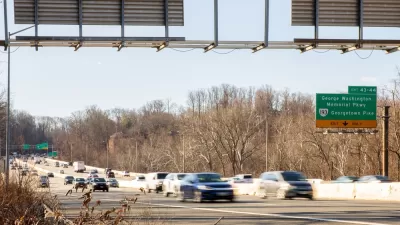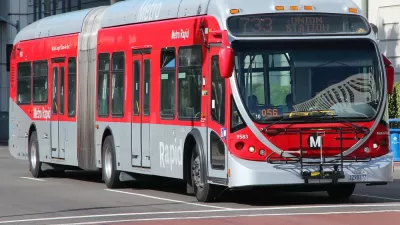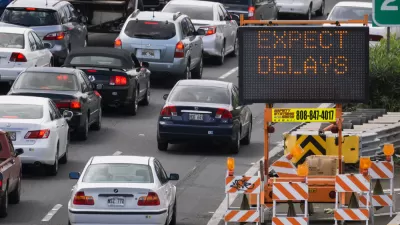There are a lot of people in this country that consider cheap gas to be a form of benevolence. Here are some reasons why they should curb their enthusiasm.
"At least on the surface, the big declines in gas prices we’ve seen over the past year seem like an unalloyed good. We save money at the pump, and we have more to spend on other things," begins a post by Joe Cortright that soon takes a turn. "But the cheap gas has serious hidden costs—more pollution, more energy consumption, more crashes and greater traffic congestion."
Cortright notes that we tend to focus on macreconomic considerations while neglecting the microeconomic. So while cheaper gas can have the effect of a tax cut, it can also quickly increase VMT, and with it, pollution and congestion.
Another, larger lesson emerges from Cortright's interpretation: "gas price fluctuations represent a terrific natural experiment in the efficacy of using pricing to manage traffic and its negative effects."
Eric Jaffe followed Cortright's work by expanding on one of the points in microeconomic column: car crashes increase as gas prices decrease.
FULL STORY: The high price of cheap gas

Study: Maui’s Plan to Convert Vacation Rentals to Long-Term Housing Could Cause Nearly $1 Billion Economic Loss
The plan would reduce visitor accommodation by 25,% resulting in 1,900 jobs lost.

North Texas Transit Leaders Tout Benefits of TOD for Growing Region
At a summit focused on transit-oriented development, policymakers discussed how North Texas’ expanded light rail system can serve as a tool for economic growth.

Why Should We Subsidize Public Transportation?
Many public transit agencies face financial stress due to rising costs, declining fare revenue, and declining subsidies. Transit advocates must provide a strong business case for increasing public transit funding.

How to Make US Trains Faster
Changes to boarding platforms and a switch to electric trains could improve U.S. passenger rail service without the added cost of high-speed rail.

Columbia’s Revitalized ‘Loop’ Is a Hub for Local Entrepreneurs
A focus on small businesses is helping a commercial corridor in Columbia, Missouri thrive.

Invasive Insect Threatens Minnesota’s Ash Forests
The Emerald Ash Borer is a rapidly spreading invasive pest threatening Minnesota’s ash trees, and homeowners are encouraged to plant diverse replacement species, avoid moving ash firewood, and monitor for signs of infestation.
Urban Design for Planners 1: Software Tools
This six-course series explores essential urban design concepts using open source software and equips planners with the tools they need to participate fully in the urban design process.
Planning for Universal Design
Learn the tools for implementing Universal Design in planning regulations.
City of Santa Clarita
Ascent Environmental
Institute for Housing and Urban Development Studies (IHS)
City of Grandview
Harvard GSD Executive Education
Toledo-Lucas County Plan Commissions
Salt Lake City
NYU Wagner Graduate School of Public Service





























